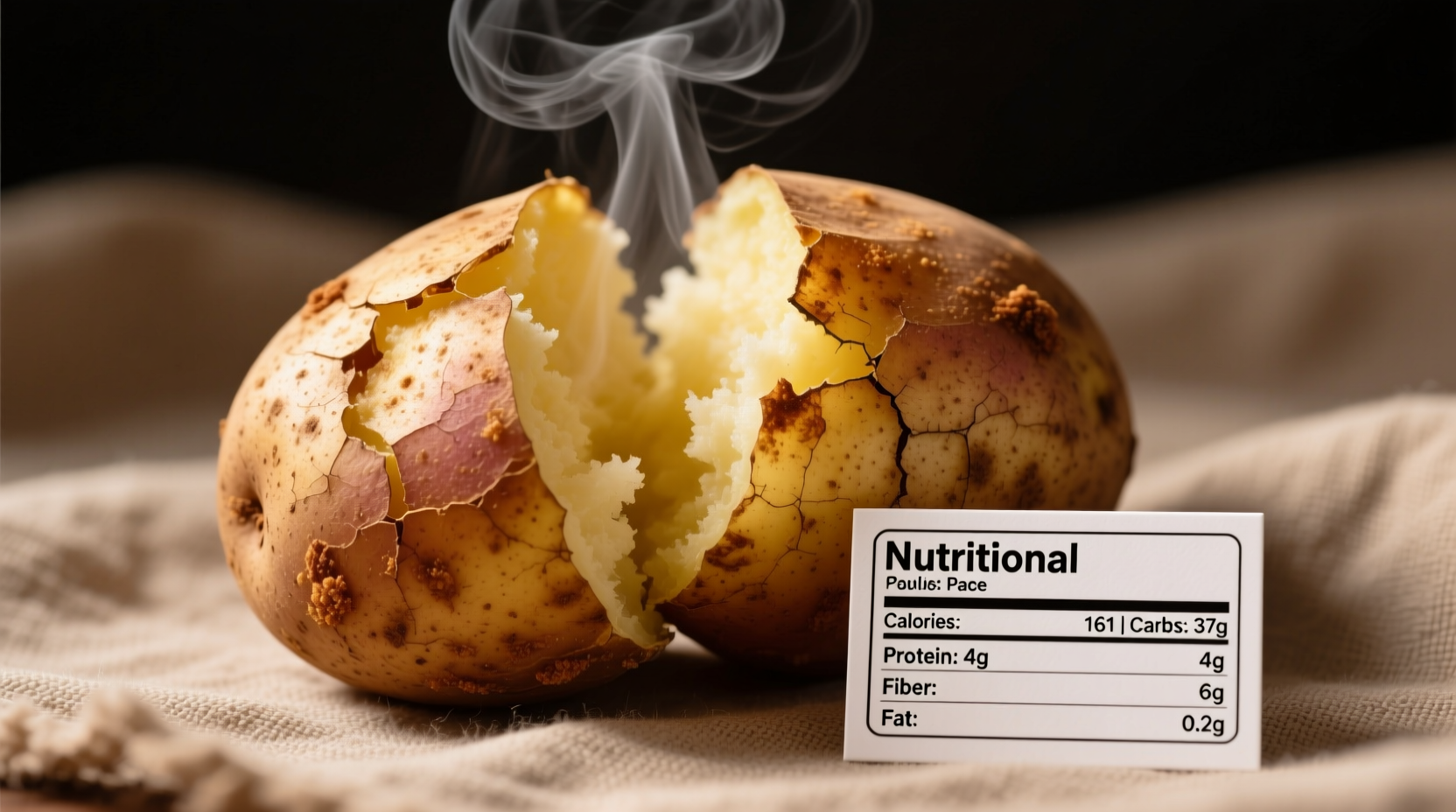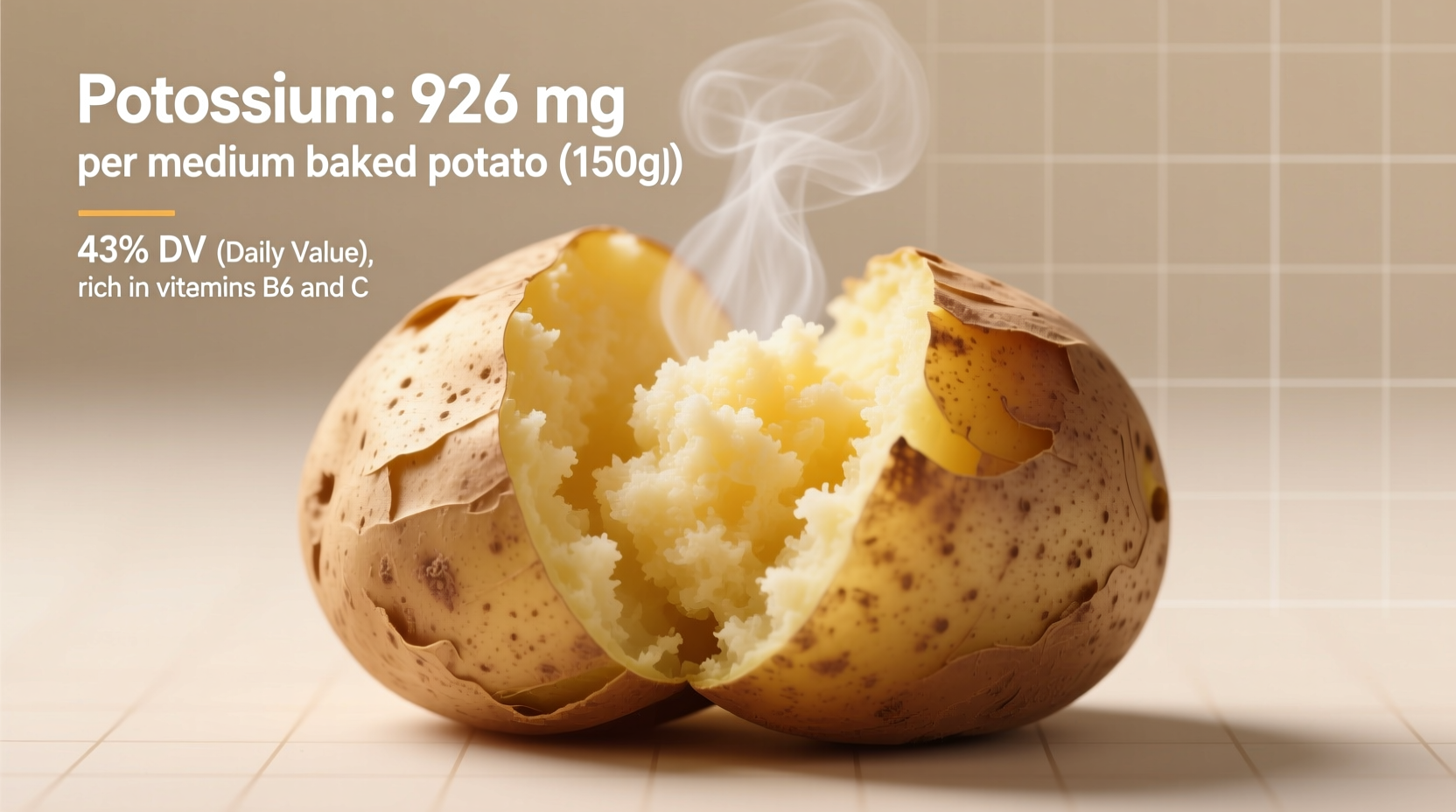Why Potassium Matters for Your Health
Understanding the potassium content in everyday foods like baked potatoes is crucial for maintaining optimal health. Potassium serves as an essential electrolyte that helps regulate fluid balance, muscle contractions, and nerve signals. According to the U.S. Dietary Guidelines, adults should consume at least 2,600-3,400 mg of potassium daily, yet most Americans fall significantly short of this target.
When you're tracking your nutrient intake, knowing exactly how much potassium in a baked potato can help you make informed dietary choices. This humble tuber proves surprisingly powerful in supporting heart health, reducing blood pressure, and counteracting the negative effects of sodium in your diet.
Potassium Content Breakdown: Baked Potato Variations
The exact potassium content in a baked potato varies based on size, preparation method, and whether you include the skin. The skin actually contains significant nutrients, so leaving it on maximizes your potassium intake.
| Preparation Method | Portion Size | Potassium Content | % Daily Value |
|---|---|---|---|
| Baked potato with skin | Medium (150g) | 926 mg | 20% |
| Baked potato without skin | Medium (130g) | 650 mg | 14% |
| Large baked potato (300g) | With skin | 1,852 mg | 40% |
| Boiled potato with skin | Medium (150g) | 750 mg | 16% |
Data source: USDA FoodData Central, Release 17 (2023)
How Baked Potatoes Compare to Other Potassium Sources
Many people assume bananas are the potassium powerhouse, but a medium baked potato actually contains more potassium than a medium banana (422 mg). Here's how common foods stack up:
- Baked potato (150g): 926 mg potassium
- Banana (118g): 422 mg potassium
- Avocado (½ medium): 487 mg potassium
- Spinach (½ cup cooked): 420 mg potassium
- Beans (½ cup cooked): 350-600 mg potassium
This comparison shows why baked potatoes deserve recognition as a top-tier potassium source. The USDA Agricultural Research Service consistently identifies potatoes as one of the most significant contributors to potassium intake in the American diet.
Practical Considerations for Different Dietary Needs
Knowing how much potassium in a baked potato helps various groups manage their nutrition:
For heart health: The American Heart Association recommends potassium-rich diets to help manage blood pressure. One baked potato provides substantial support toward this goal without added sodium.
For athletes: Endurance athletes lose potassium through sweat and need replenishment. A baked potato makes an excellent post-workout recovery food when paired with protein.
For kidney health: Individuals with kidney disease often need to monitor potassium intake. While potatoes remain nutritious, those with compromised kidney function should consult their healthcare provider about appropriate portions.
Preparation tip: If you need to reduce potassium for medical reasons, try the "double boil" method—boil sliced potatoes, discard the water, then boil again. This can reduce potassium content by up to 50%.

Additional Nutritional Benefits of Baked Potatoes
Beyond potassium content, baked potatoes offer impressive nutritional value:
- Vitamin C: One medium potato provides about 28% of your daily vitamin C needs
- Fiber: With skin, contains 3 grams of fiber (12% of daily value)
- Vitamin B6: Delivers 25% of your daily requirement for this essential vitamin
- Magnesium: Contributes 8% of daily needs for this important mineral
Unlike processed potato products, a plain baked potato contains no added fats, sugars, or sodium. The natural complex carbohydrates provide sustained energy release, making it an excellent choice for balanced blood sugar management.
Maximizing Nutritional Value: Preparation Tips
To get the most potassium and nutrients from your baked potato:
- Keep the skin on: The skin contains nearly half the fiber and significant potassium
- Avoid overcooking: Extended cooking times can degrade some nutrients
- Pair with healthy fats: A small amount of olive oil or avocado helps absorb fat-soluble vitamins
- Try different varieties: Purple potatoes offer additional antioxidants while maintaining similar potassium levels
Remember that adding high-fat toppings like butter, sour cream, or cheese significantly changes the nutritional profile. For maximum health benefits, top your baked potato with Greek yogurt, salsa, or steamed vegetables.
Frequently Asked Questions
How much potassium is in a large baked potato?
A large baked potato (approximately 300g with skin) contains about 1,852 milligrams of potassium, which represents roughly 40% of the recommended daily value for most adults. This makes a single large baked potato an excellent way to significantly contribute to your daily potassium needs.
Does baking a potato reduce its potassium content?
Baking actually preserves more potassium than boiling. When potatoes are boiled, potassium leaches into the cooking water. Baking retains nearly all the potassium content, especially when the skin is left on. According to USDA research, baked potatoes maintain approximately 95% of their original potassium content compared to boiled potatoes which may lose 15-20% to the water.
How does potato potassium compare to banana potassium?
A medium baked potato (150g) contains 926 mg of potassium, while a medium banana (118g) contains 422 mg. This means a baked potato actually has more than twice the potassium of a banana. Despite the common belief that bananas are the top potassium source, potatoes provide significantly more of this essential mineral per serving.
Can I get too much potassium from eating baked potatoes?
For healthy individuals with normal kidney function, it's difficult to get too much potassium from food sources alone. However, people with kidney disease or those taking certain medications (like ACE inhibitors) may need to monitor their potassium intake. If you have kidney concerns, consult your healthcare provider about appropriate potato portions. For most people, enjoying one or two baked potatoes weekly fits well within a balanced diet.
Does the type of potato affect potassium content?
Most common potato varieties (Russet, Yukon Gold, red potatoes) have similar potassium content when comparing equal weights. Russet potatoes, commonly used for baking, contain about 926 mg per medium potato. Specialty varieties like purple potatoes have comparable potassium levels but offer additional antioxidants. The cooking method and whether the skin is consumed affect potassium content more significantly than potato variety.











 浙公网安备
33010002000092号
浙公网安备
33010002000092号 浙B2-20120091-4
浙B2-20120091-4